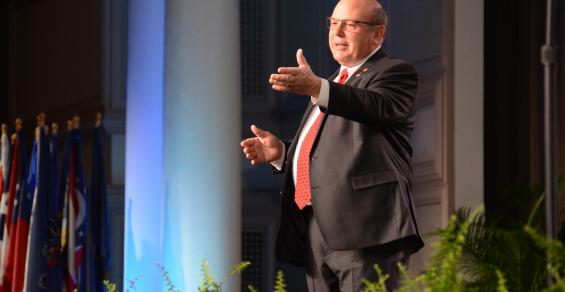Some 7,000 members of the American Farm Bureau Federation congregated in Nashville over the weekend for the 99th annual AFBF convention, which kicked off at the Opryland Hotel. The hot topics for nearly everyone include President Trump’s impending visit on Monday, ongoing NAFTA trade negotiations and the pending Farm Bill – and what the President might say about either topic.
AFBF president Zippy Duvall, a Georgia farmer, welcomed the membership during its opening session on Sunday, telling them that with the new administration, “Things have changed a lot in Washington, D.C. The door to this administration opened up for farmers and ranchers on day one.”
Duvall said Ray Starling, special assistant to the President for agriculture, trade and food assistance, promised him agriculture would have a seat at the table with the Trump administration.
“We’ve made real progress on some of our biggest issues because agriculture has been united,” Duvall added, who’s served as AFBF president during both the Obama and Trump administrations.
“I can tell you that it has been a breath of fresh air to be able to advocate for getting things done, instead of having to constantly defend agriculture against a steady stream of challenges from our own government,” he said. Duvall pointed to progress in “ditching” the Waters of the U.S. rule, and the reduction in size of two land monuments in Utah that were enlarged during the previous administration and reduced access to grazing land and water resources. He also spoke confidently of the new tax code reforms.
“We didn’t get the elimination of the estate tax but we got the exemption doubled. That will take out 99% of farmers that might face that situation,” he said, adding it’s a temporary fix that AFBF would like to see become permanent. “We picture this new tax code as really encouraging to help us pass our farms on and keep people on the land.”
When pressed on what he might tell President Trump should he have the chance, Duvall had a running list. Most notably, trade was not at the top.
“After thank yous, I’m going to roll immediately to the biggest problem that faces American agriculture and that’s immigration. Farmers are worrying about whether they’ll have enough people to get the job done. That’s the biggest limiting factor on the farm, and it’s the biggest limiting factor on bringing the next generation back,” Duvall said.
After that? “Then I will tell him the people in the room are nervous about trade. None of us know what’s going on behind closed doors,” he said, adding, “All we know is this President told me and 15 others in the Roosevelt Room that we’d be happy with what came out of it.”
Duvall recognizes that the North American Free Trade Agreement is more than 20 years old and needs adjustments but is also concerned that renegotiating it is distracting trade officials from focusing on new markets and new bilateral or multilateral trade deals. He says AFBF continues to emphasize to officials that most of the world’s population lives outside the U.S. and farmers need to be able to trade with them.
Next – if he has time – will be the farm bill. “We need to make sure they know how important risk management tools like crop insurance are to our farmers.”
Duvall is also concerned about crucial positions that remain open and unfilled throughout USDA and EPA.
“How they do anything with one hand tied behind their back, I don’t know. It’s almost a miracle they can get done what they are. We want to get these appointments moving forward.
“Our country needs full staffing and our people deserve it.”




Leave A Comment